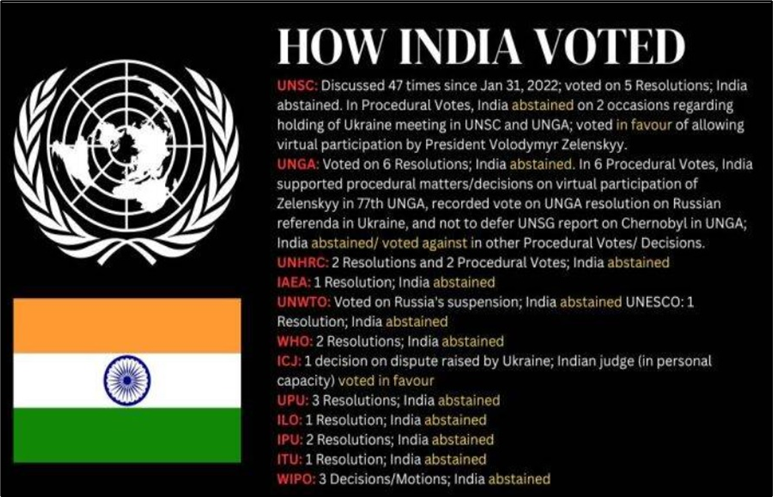Why in news?
- As the Russia-Ukraine war completes a year, the United Nations General Assembly is discussing a resolution calling for the need to reach, as soon as possible, a comprehensive, just and lasting peace.
- Various countries, including Ukraine, have urged India to support a UNGA resolution timed for the first anniversary of the war.
What’s in today’s article?
News Summary: Evolution of India’s position on the Russia-Ukraine War
- Strategic autonomy
- For India, the Ukraine war has been an opportunity to practice strategic autonomy.
- Adopting a nuanced neutrality, Delhi has maintained its relationship with Moscow and worked around Western sanctions to buy oil from Russia.
- As much as 25% of India’s oil purchase is now from Russia, from less than 2% before the war.
- India’s voting at UN and its bodies

- In the last year, the UN and its bodies have voted on resolutions pertaining to the Russia-Ukraine war at least 39 times: 38 times since Russia invaded Ukraine on February 24 and once in January 2023.
- India, which has maintained a diplomatic balancing act and has walked the tightrope between US-led West and Russia, has abstained on most occasions.
- More calibrated stance adopted by Delhi in the past one year
- So far, India has taken a calibrated stance based on its own national interests.
- It had said it was deeply disturbed, but did not name Russia at all.
- It called for cessation of violence and hostilities, which is permanent in nature.
- It had flagged its core concern about Indian nationals. About 22,000 Indian nationals, mostly students, had to be evacuated by special planes.
- It called for respect for territorial integrity and sovereignty, and respect for UN charter and international law.
- It maintained that dialogue and diplomacy is the path forward.
- During the early phase of the war, India relied on balancing act since it needed cooperation from both Russian and Ukrainian sides to evacuate its citizens from the conflict zone.
- After its last batch of students were airlifted by the second week of March 2022, the Indian position focused on the other elements: respect for UN charter, territorial sovereignty and integrity.
- Although, after the Bucha massacre - in which innocent civilians were killed - India joined the western chorus in condemning the incident.
- It even asked for an international probe.
- Nukes must be off the table
- As Russian President Putin and other Russian leaders made nuclear threats, India expressed concern.
- India categorically said that no side should resort to the nuclear option.
- Later, Central Intelligence Agency (CIA) chief said PM Modi’s concerns about the use of nuclear weapons have had an impact on the Russians amid Ukraine war.
- India and the issue of food grains
- New Delhi was approached by Ukraine and other partners to intercede when the issue of food grains being blocked by Russia was raised.
- India stepped in to convey its message to Moscow.
- India: SCO & G-20 declaration
- PM Modi’s said to Russian President in Samarkand in September 2022 on the sidelines of the SCO: that “this is not an era of war”.
- This became India’s mantra, which even found its way into the G-20 declaration in Bali.
- First virtual summit of the Voice of the Global South
- New Delhi’s position also evolved as it felt the impact of the rising energy prices and prices of commodities.
- In January 2023, India hosted the first virtual summit of the Voice of the Global South, where it raised the issue of rising prices of food, fuel and fertiliser.
- It also flagged the concerns of the developing and the less-developed world on energy and food security. This will now be the consistent theme till the G-20 summit.
- India and the upcoming G-20 summit
- With a year of geopolitical turmoil due to the Russia-Ukraine crisis, India — as the chair of G-20 — will face the challenge of negotiating a declaration while balancing between Russia and the West.
Conclusion
- So far, India has walked on a diplomatic tightrope while maintain strategic autonomy in its decision making and promoting its national interests.
- But the longer the war continues, the more pressure on India from the Western alliance to choose the right side.
- Eg., this week, Ukraine asked India to support a UNGA resolution timed for the first anniversary of the war, asking Russia to withdraw from its territory.
- In this context, serious diplomatic efforts needs to be made to end the war and the upcoming G-20 presidency can be used as a platform towards this direction.










